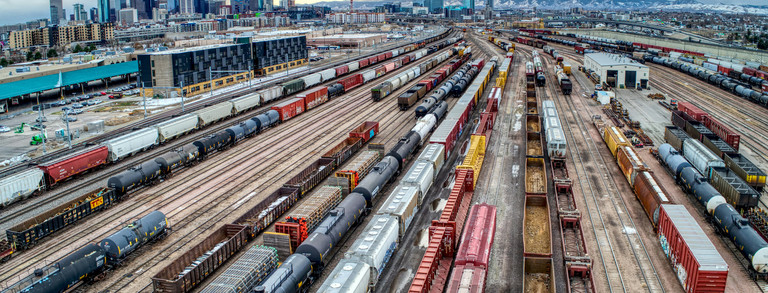Uncertainty quantification for decision support in transport logistics systems
B03 aims at decision support for the optimal scheduling of tasks and the assignment of resources in transport logistics facilities. The goal is a cost-oriented focus on records to be collected and aid decision-making, reducing costs in terms of money, energy and operation time. In the long run, statistical methods will be provided for different transport logistics nodes as elements of supply chains, which will allow the optimization of local decisions with an end-to-end view in global networks.
Project Leaders
Prof. Dr.-Ing. Uwe Clausen
Department of Mechanical Engineering - Institute of Transport Logistics
TU Dortmund University
Prof. Dr. Sonja Kuhnt
Faculty of Computer Science - Mathematical Statistics
Fachhochschule Dortmund - University of Applied Sciences and Arts
Summary
Global trade and e-commerce have led to an increase in commercial transport worldwide. More and more logistical hubs are built, which require quick, informed logistical decisions. Reducing greenhouse gas emissions and increasing energy efficiency are of growing importance in the transport sector. Logistics as a discipline for designing and managing spatio-temporal configurations of production and distribution systems requires researchers and practitioners to understand and operate transport logistics facilities better.
Our project aims to enhance the decision-making and design processes for transport logistic systems by using simulation studies, developing appropriate surrogate models, sensitivity analysis methods, and global optimization algorithms. The project addresses systems like container, parcel sorting, and less-than-truckload terminals. One source of uncertainty are data sets for system loads and process settings that are essential for simulation experiments of transport logistic systems. System loads include the geocoded location of each shipment’s destination, its arrival times and due dates for departure, and specific information about the shipments. The uncertainty in logistic key performance indicators due to uncertainties in system load, process, and decision variables will be assessed by global sensitivity analysis. We will develop Sobol and Shapley type sensitivity measures for dependent spatio-temporal and categorical input variables and methods to ascertain the value of information. Applied to system load variables and process settings, this will allow a cost-oriented focus on the data sets to be collected from reality.
Decisions in transport logistics systems are the choice of the most appropriate system configurations, e.g., scheduling of tasks and allocation of resources such as equipment, space, and personnel. In a simulation, these configurations are included as decision variables. The effect on operational characteristics (e.g., the dwell time, CO2 emissions of the sorting process, terminal-operating times) are of interest and should be optimized. Sensitivity analysis, predictions, and global optimization results from fast-running statistical surrogate models of the simulator will support operator decisions, especially when they need to be taken under uncertainty. The project will develop surrogate models, e.g., Gaussian process models (kriging), for mixed numeric, categorical, and spatio-temporal predictor variables. From a logistics perspective, this first phase of TRR 391 aims to develop fast algorithms for tactical decision support in transport logistics facilities.



